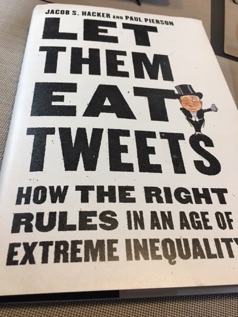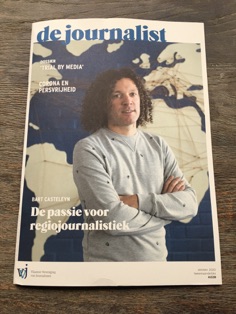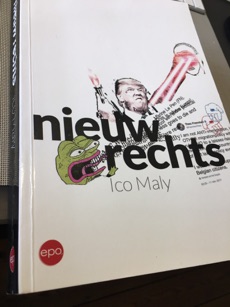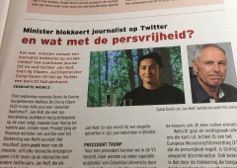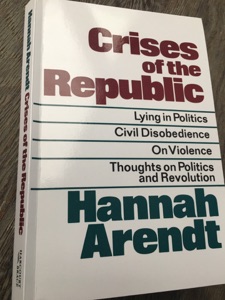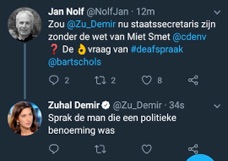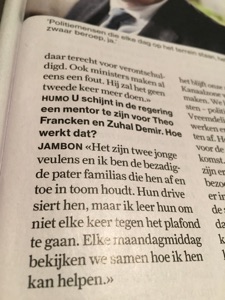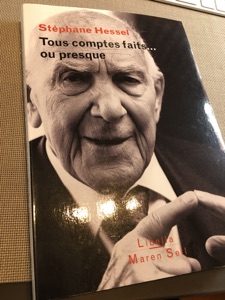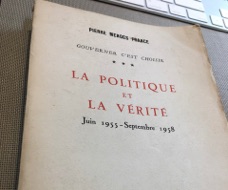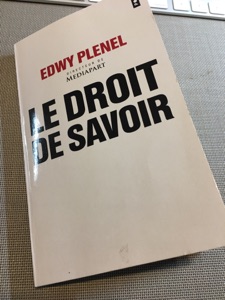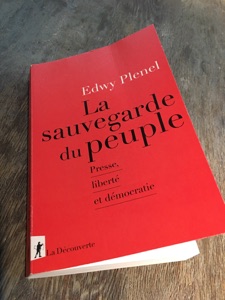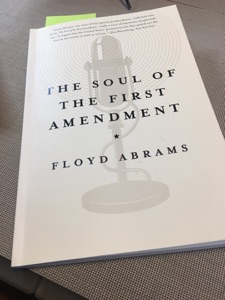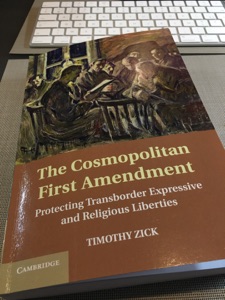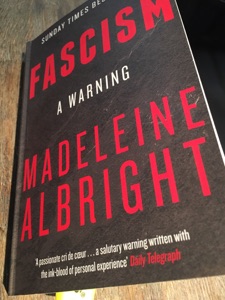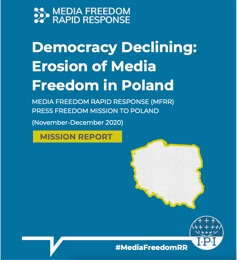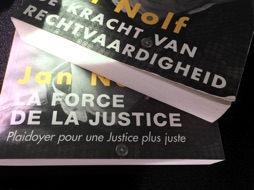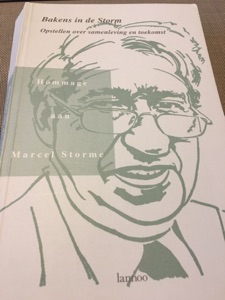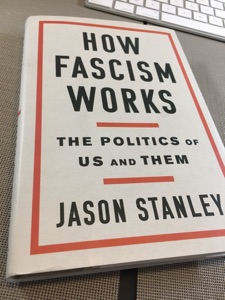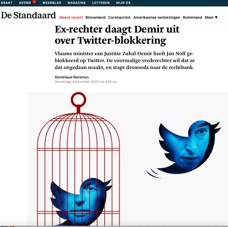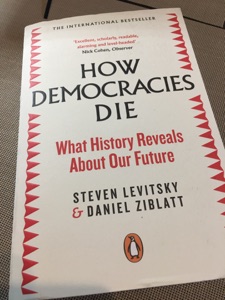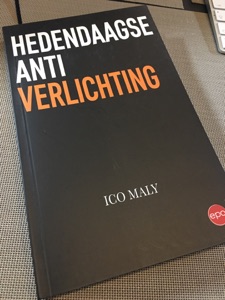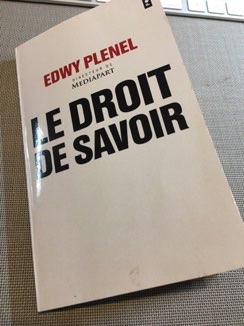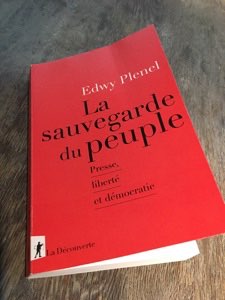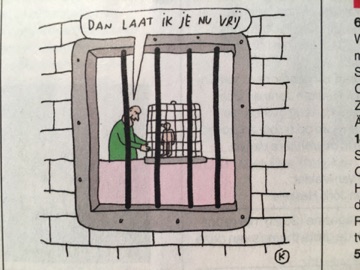QUESTIONING JUSTICE
2020/21

Twitter arm wrestling Tatu against Ferrand: French justice finally En Marche !
Finally, a first round won by Guillaume Tatu v. Richard Ferrand. His ''final fight'' for his unblocking on Twitter will be long, but with this ''European first'' finally starts an important legal debate for the freedom of expression in general and the free press in particular.
Twitter: an instrument of struggle.
"The Internet is an instrument of struggle" was Edwy Plenel's encouragement already in 2013 against "the infantilization of citizens in a regime that is supposed to entrust them with power" and against those who want to "submit the Internet to their oligarchic, political and economic interests, to normalize it and control it according to rules contrary to its own vitality" (‘Le droit de savoir’, Editions Don Quixote 2013, p. 106 - 109).
This is even more true for Twitter.
Some politicians - of the conservative, authoritarian and paternalistic type - do not like the essence of this platform for the citizen: the free communication of thoughts and opinions.
Moreover, for the journalistic world, Twitter is an important source of information, even unavoidable: for the simple reason that the political world itself bypasses the classic journalistic networks by its 'first and live' communications via Twitter. Even if it is mainly for propaganda reasons, a tweet of a politician becomes - by the political calculation that accompanies it - a political fact.
This is why "basically, blocking a journalist on Twitter hinders the monitoring function of the press" (statement of the Flemish Union of Journalists VVJ @vvvjournalisten in its monthly 'De Journalist' of December 2020 and confirmed in an alert on Mapping Media Freedom MFRR & ECPMF)
Following the strong intervention of the VVJ, I was finally unblocked by Mrs. Zuhal Demir, the Flemish (regional) Minister of Justice, a blocking that lasted from September 28, 2020 to February 25, 2021.
In France, the block on Twitter that the fourth person of the state, Richard Ferrand, president of the National Assembly, still imposes on the journalist Guillaume Tatu (former media advisor to Jean-Luc Mélenchon and currently deputy mayor of Annecy) already dates from September 2018.
Let's see first the stages of the procedure, and then a provisional finding, while waiting for 'the final fight' ...
The origin and legal basis of the complaint Tatu v. Ferrand.
In his penal complaint of December 20, 2018, the Paris-based lawyer Arash Derambarsh demonstrated that the blocking by Richard Ferrand was inflicted on his client as a retaliatory measure related to the fact that he had relayed on social networks press articles on the so-called "Mutuelles de Bretagne" affair (revealed by Le Canard Enchaîné of May 24 and June 28, 2017).
In this Breton affair, Richard Ferrand was finally indicted on September 11, 2019 (after a first filing without prosecution by the prosecutor of Brest, but following a complaint by Anticor and after deferral of the procedure in Lille).
Guillaume Tatu's complaint, filed as an 'independent and committed journalist', was based on art 22-5 of the French penal code, the offence of discrimination, notably of political opinion.
Guillaume Tatu admits that "his (own) positions are obviously subjective and personal, like some journalists who express themselves regularly".
In this particular context, the blocking by the president of the National Assembly (former minister, and at the head of the presidential political party 'La République en Marche') "is clearly a discrimination with regard to his editorial positions, therefore political".
This blocking "creates discrimination with regard to the importance of the information that is disseminated via the Twitter account @RichardFerrand, used and broadcast as a media in its own right".
This Twitter account must indeed be considered "as a profile of general interest" and "the information that Mr. Ferrand relays, the articles shared by him and his reactions on his Twitter feed must therefore be accessible to all citizens.
First defeat: vertical classification by the Public Prosecutor.
This complaint was closed without action on March 13, 2019 by a notice of closure motivated by the Prosecutor's Office, emphasizing that "the facts denounced or revealed in this case are not punishable by a criminal text" (source: Le Parisien of April 11, 2019).
Second defeat: the investigating judge refuses to investigate.
After this classification without continuation by the prosecutor, Guillaume Tatu logically addressed the investigating judge.
His counsel Arash Derambarsh argued that this blockage had impeded his right to express his editorial and political positions and had hindered the exercise of his profession as an independent journalist.
This did not succeed either, as Judge Emmanuelle Cimamonti considered in her order of September 27, 2019 that "this restriction does not prevent him from expressing himself on the matters he intends to deal with and from making his opinions known by other means" and that Guillaume Tatu "does not demonstrate that the Twitter account of Mr. Richard Ferrand is the sole source of information on the subject he intends to deal with." In addition, the judge found that the Twitter account "in all likelihood does not constitute a privileged source of information on this subject".
As I wrote in my post of January 7, 2021 (Club Mediapart): "By these reasons and in a formula half ironic, half scornful, the investigating judge denies in a disconcerting way the real role that social media play in the journalistic profession. It is still mind-boggling to read that a journalist should be content to follow only the @RichardFerrand account as a source of information about the Mutuelles de Bretagne affair in order to then be able to win a case for discrimination in the event of blocking by the President of the National Assembly - for that is ultimately the absurd logic of the investigating judge.
These motives of judge Cimamonti are completely foreign to the reality of the journalist's job, yes, this "ferment of disorder and discord" in the naughty words of Edwy Plenel, who proposes as "the secret hymn of investigative journalism the song of Georges Brassens 'les braves gens n'aiment pas que l'on suive une autre route qu'eux' " ('Le droit de savoir', p. 13 - 15).
But moreover, it is the absolute negation of the problem of the 'workarounds' that the citizen-journalist must take to access the information of the source, in that case the president of the National Assembly communicated through his Twitter account".
First victory in appeal, at the Chamber of Instruction (Paris Court of Appeal): justice is on the march!
A welcome surprise: in his (written) indictment of June 29, 2020, the Attorney General had already requested that the order be overturned and that the file be returned to the investigating magistrate for further (or rather first) inquiry.
However, at the subsequent hearing, the Public Prosecutor's Office requested confirmation of the order: how to explain this 180° turnaround, one wonders.
In its decision of March 11, 2021, the Paris Court of Appeal explicitly referred (only) to “the written submissoins of the Public Prosecutor” (of June 29th 2020).
Snubbing that remarkable changement of position of the Prosecutor’s office, the Court followed the arguments by Guillaume Tatu’s lawyer Arash Derambarsh, assisted with Paris based lawyer Thierry Vallat.
The Paris Court considered that "the investigating magistrate limited himself without prior verification to stating that the material element of the infraction does not exist".
It therefore requests that all useful investigations be carried out to "verify the reality of the facts denounced and the constituent elements of the infraction in question".
The Court requires in this regard an investigation "with regard to the quality of the account holder, the function assumed by the Twitter account concerned, the public or publics that 'follow' the said account".
Finally, the Court asks to "obtain all the details on the circumstances of the current blocking (date, reason and extent) as well as on the impact that this blocking is likely to have on the complainant and his activities".
It's hard to follow better the line of American jurisprudence in Knight First Amendment v. Trump!
What now? Intermediate review.
So the investigation is only now starting, ...finally!
A first observation: on justice.
The first observation is still bitter, with a slow and timid French judiciary, wavering at the level of the French public prosecutor's office to do a basic job that worries a high political figure.
The European Court of Human Rights (ECHR in Strasbourg) and the Court of Justice of the European Union (CJEU in Luxembourg know something about that very ‘relative’ independence of the French prosecutor’s office (just read again Le Canard Enchaîné on March 10 2021 p. 3: “La justice européenne fait grincer le parquet’ - ‘European justice makes the public prosecutor’s office groan’).
This is a long and sad French tradition. The exceptions are the investigations that - even with great delay - start after alerts by the 'fourth constitutional power', the free press.
Not the press of the regime, the one of the flatterers and the courtiers, but the press that disturbs, like Mediapart.
It is after these alerts, as well as those of the Canard Enchaîné - certainly not only satirical - that justice is forced to start.
And sometimes, it works, as we saw again recently with the false Paul Bismuth.
A second observation: on this elite on Twitter.
However, no one thinks here of the maximum penalty of five years in prison and 75,000 euros fine.
The only thing Guillaume Tatu is basically considering is the unblocking of Twitter, which will restore his personal and professional right to information and communication.
Obviously, the president of the National Assembly is not fooled. In the eyes of public opinion - and his audience on Twitter - he risks being seen as the loser. In view of this unilateral and haughty discourse that his blocking imposes, a forced unblocking by the justice will be experienced as a humiliation.
However, it is his very authoritarian attitude that is the source of this impression of lèse-majesté. Not to support the free speech of a citizen, or the criticism - even if it is harsh or virulent - of a journalist, is proper to this neo-monarchic conception of a self-proclaimed elite of French politics.
Twitter has no value for them in the democratic debate. Twitter is reduced to a form of vertical marketing. It is part of an attempt to avoid democratic debate by the plutocracy.
In their book - with a title inspired by Marie Antoinette - the American authors Jacob S. Hacker and Paul Pierson point to "three fundamental threats to healthy democratic politics: divergent elite interests, disproportionate elite power, diminished elite commitment to democracy itself.' 'Let Them Eat Tweets. How The Right Rules In An Age Of Extreme Inequality' p. 41)
If we let this happen, 'it leads to the dictatorship of an increasingly wealthy and extreme minority' these same authors warn us.
Trump was a terrible example of this and the struggle is not won.
A third observation: Guillaume Tatu's final struggle has only just begun, but the omens are (finally) good.
This is indeed a European first, after the legendary Knight First Amendment v. Trump case in the United States.
We agree: American judgments obviously do not constitute any 'precedent' for French justice, if only for the simple reason that continental justice does not know jurisprudence by precedent,
However, as the Paris Court of Appeal clearly understood, the fundamental logic of the American judges is undeniable.
Of course, U.S. case law recognized that "the government is correct that individual plaintiffs do not have the right to demand that the President listen to their speech" but "the speech restrictions in question impede (their) ability to converse on Twitter with others who might speak to or about the President. (...) Once he opens the interactive features of his account to the general public, he has no right to censor certain users for expressing views with which he disagrees" (July 7, 2019 ruling by the Second Circuit of the U.S. Court of Appeals at 24-25/29 in Knight First Amendment v. Donald Trump).
Meanwhile, in Washington, the Supreme Court will consider next Friday, March 26, 2021, for the 14th time the fate of Donald Trump's appeal, which has become legally 'moot' since his 'permanent' ouster from Twitter and the election of his successor. The Fourth Circuit Court of Appeals' jurisprudence will however remain.
All this should inspire us, and it clearly inspired the Paris Court of Appeal already.
Guillaume Tatu's final battle has only just begun, but the omens are finally better, even excellent.
(read further about Free Press & Free Speech on my Law Blog Justwatch here)
EPILOGUE
On the day Flemish minister of Justice Zuhal Demir unblocked me, I discovered in the weekly Humo this fantastic, fitting cartoon of Belgian artist Luc Zeebroek, knows as Kamargurka (Twitter @LucZeebroek ).
You will find his work on his website kamagurka.com but by courtesy of his amical permission, I let you enjoy this one here below.
The text in Dutch is: “Then I let you free for now”....
twitter case tatu v. ferrand
23 maart 2021
Edwy Plenel, proposes in ‘Le droit de savoir’ as "the secret hymn of investigative journalism the song of Georges Brassens 'les braves gens n'aiment pas que l'on suive une autre route qu'eux' " (‘those good people do not like we follow another road than them’). Enjoy here
